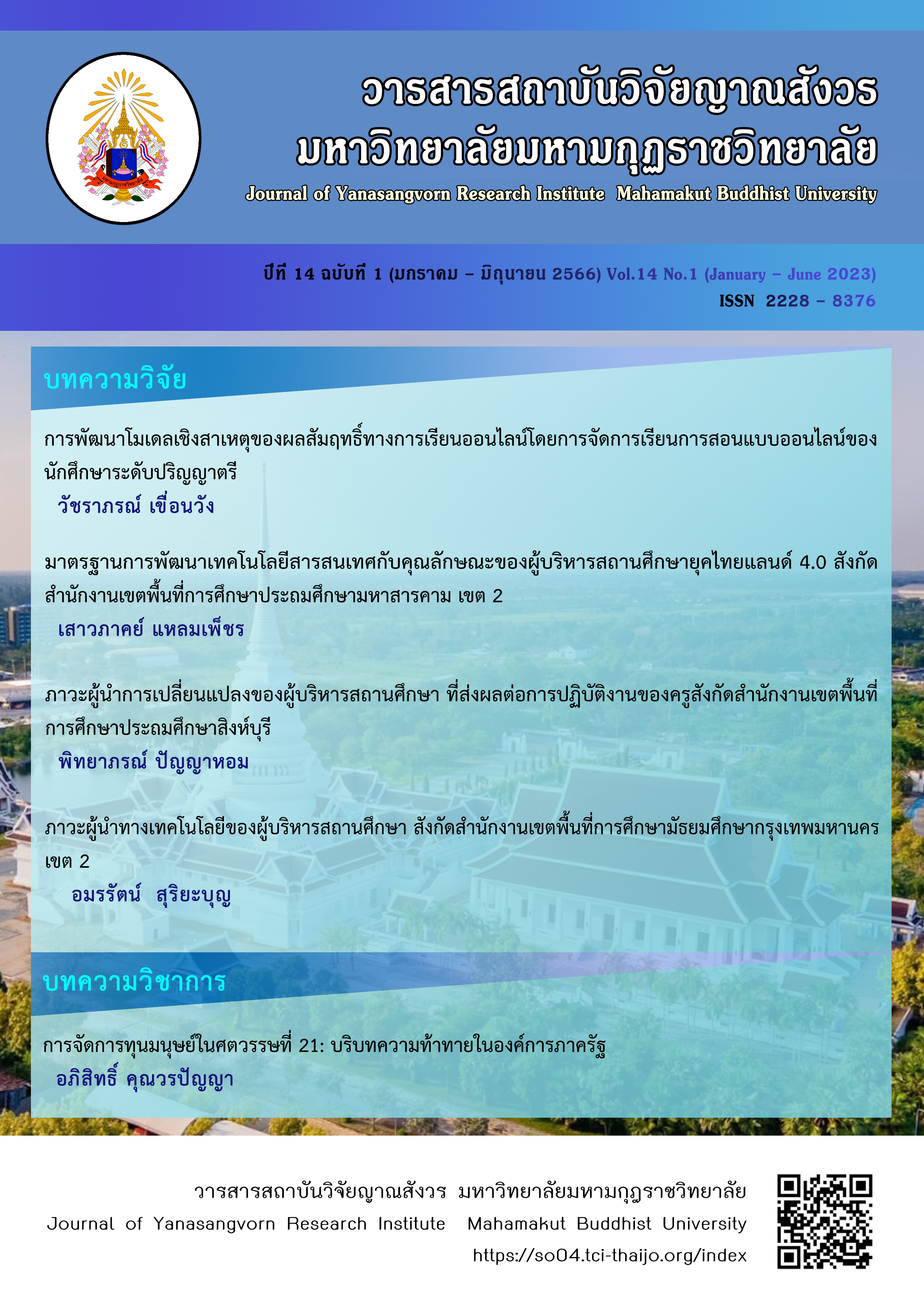CONCEPT OF STATE POWER UNDER THE RULER OF MACHIAVELLI AND THE ACQUISITION OF POWER BY THE THAI COUP JUNTA
Main Article Content
Abstract
After the change of government from an absolute monarchy to a democratic system with the King as the head of state. The political situation of the Thai state has seen 13 coups. The junta has claimed the legitimacy of seizing power by reasoning that to resolve conflicts and chaos in the country, the study of the concept of state power through Machiavelli writing “The Prince". The study found that the parallel between the idea of state power under Machiavelli's ruler and the acquisition of power by the Thai coup d'état. Since the three characteristics of parents are: 1. Parents do not need to keep their promises. considered from solving political problems by coup d'état which is not in accordance with the mechanism of democracy, 2. looks like both a lion and a fox that is to say, power is used to create fear, is the nature of the lion and the use of constitutional mechanisms to maintain power and 3. the Thai coup d'état did not apply principles based on virtue. Because a coup is a process of changing the government by infringing methods. and lead to the way of obtaining the power of the Thai coup d'état When considering the reasons for the seizure, it relates to the interests, acquisition and retention of military power. This is evident from the history of coups in all eras.
Article Details

This work is licensed under a Creative Commons Attribution 4.0 International License.
References
กรุงเทพธุรกิจออนไลน์. (2563). ย้อนรอย ‘19 กันยา’ กับ 13 ‘รัฐประหาร’ ไทย รอบแผลเป็นบนถนนประชาธิปไตย. กรุงเทพธุรกิจ. สืบค้นวันที่ 25 สิงหาคม 2565, เข้าถึงได้จาก https://www.bangkokbiznews.com/politics/897979
กานต์ บุณยะกาญจน์. (2562). The Prince 2019 : มาคิอาเวลลีกับการเมืองไทย เมื่อกลอำนาจอยู่ในมือพ่อมด (สัมภาษณ์โดย ปาณิส โพธิ์ศรีวังชัย). The101.world. สืบค้นวันที่ 24 สิงหาคม 2565, เข้าถึงได้จาก https://www.the101.world/the-prince-2019
การุณ ใสงาม. (2550). มาเคียเวลลี่สอนอะไร พลเอกสุรยุทธ์. ผู้จัดการออนไลน์. สืบค้นวันที่ 23 สิงหาคม 2565, เข้าถึงได้จาก https://mgronline.com/daily/detail/9500000038410
โกวิท วงศ์สุรวัฒน์. (2561). รัฐประหาร พ.ศ.2494 กับรัฐธรรมนูญแห่งราชอาณาจักรไทย พ.ศ.2492. มติชน.สืบค้นวันที่ 26 สิงหาคม 2565, เข้าถึงได้จากhttps://www.matichon.co.th/article/news_1269307
ชาดา นนทวัฒน์. (2552). กบฏแผ่นดิน แย่งชิงอำนาจ. กรุงเทพฯ: ยิปซี.
เนาวรัตน์ สุขสำราญ. (2557). Suthep in talks with Prayuth ‘since 2010’. Bangkok Post. สืบค้นวันที่ 29 สิงหาคม 2565, เข้าถึงได้จาก https://www.bangkokpost.com/thailand/politics/416810/suthep-in-talks-with-prayuth-since-2010
ปฐม มณีโรจน์ และ สุนทร เกิดแก้ว. (2520). การปฏิรูปการปกครองแผ่นดิน : ประมวลเอกสารสำคัญทางการเมืองระหว่าง 6 ตุลาคม-22 ตุลาคม 2519. กรุงเทพฯ : โครงการผลิตเอกสารประกอบการศึกษาทางรัฐประศาสนศาสตร์ สถาบันบัณฑิตพัฒนบริหารศาสตร์.
ประชา เทพเกษตรกุล. (2535). การแทรกแซงทางการเมืองของทหารไทย: ศึกษาเฉพาะกรณีการรัฐประหาร เมื่อวันที่ 23 กุมภาพันธ์ พ.ศ.2534. วิทยานิพนธ์รัฐศาสตรมหาบัณฑิต สาขาการปกครองคณะรัฐศาสตร์ มหาวิทยาลัยธรรมศาสตร์.
มาคิอาเวลลี, นิโคโล. (2552). The Prince เจ้าผู้ปกครอง (สมบัติ จันทรวงศ์, แปล). กรุงเทพฯ : โครงการจัดพิมพ์คบไฟ. (ต้นฉบับตีพิมพ์ ค.ศ.1532)
___________(2560). The Prince เจ้าผู้ครองนคร (สรวงอัปสร กสิกรานันท์, แปล). กรุงเทพฯ : แอร์โรว์ คลาสสิกบุ๊คส์. (ต้นฉบับตีพิมพ์ ค.ศ.1532)
รุ่งมณี เมฆโสภณ. (2555). อำนาจ 2 ต่อสู้กู้ชาติ เอกราษฎร์ อธิปไตย. กรุงเทพฯ: บ้านพระอาทิตย์.
เริงศักดิ์ กำธร. (2545). กินอยู่เรียบง่ายสบายแบบชาวบ้าน ชวน หลีกภัย ลูกแม่ค้าขายพุงปลา. กรุงเทพฯ: เฟื่องอักษร.
วสันต์ ลิมป์เฉลิม. (2553). มองความขัดแย้งของการเมืองไทยผ่านแนวคิดมาคิอาเวลลี. ประชาไท. สืบค้นวันที่ 23 สิงหาคม 2565, เข้าถึงได้จาก https://prachatai.com/journal/2010/02/27635
วินัย ผลเจริญ. (2556). ทฤษฎีสังคมและการเมือง. มหาสารคาม : มหาวิทยาลัยมหาสารคาม.
สุทธินันท์ สุวรรณวิจิตร และ วรวิทย์ กลิ่นสุข. (2564). ทหารกับการเมืองในประเทศไทย. Journal of Modern Development ปีที่ 6 (2). สืบค้นวันที่ 29 สิงหาคม 2565, เข้าถึงได้จาก https://so06.tci-thaijo.org/index.php/jomld/article/download/247218/168344/879025
วีระ สมบูรณ์. (2561). ทฤษฎีการเมืองกับความสัมพันธ์ระหว่างประเทศ. กรุงเทพฯ: WAY of BOOK.
สุรชาติ บำรุงสุข. (2551). ไตรสรณคมน์ทหาร รัฐประหาร และการเมืองไทย. กรุงเทพฯ: สถาบันปรีดี พนมยงค์
___________(2558). เสนาธิปไตย:รัฐประหารกับการเมืองไทย. กรุงเทพฯ: มติชน
สุรพศ ทวีศักดิ์. (2560). อัตลักษณ์ ‘คนดี’ กับความล้าหลังของประชาธิปไตยไทย. ประชาไท. สืบค้นวันที่ 26 สิงหาคม 2565, เข้าถึงได้จาก https://prachatai.com/journal/2017/12/74699
iLaw. (2563). ปัญหารัฐธรรมนูญ 2560 : สิทธิเสรีภาพที่อยู่ภายใต้ “ความมั่นคงของรัฐ”. iLaw. สืบค้นวันที่ 26 สิงหาคม 2565, เข้าถึงได้จาก https://ilaw.or.th/node/5735
___________(2565). ย้อนความจำ 12 ปี กรุงเทพฯ ภายใต้ประชาธิปัตย์ กปปส. และ คสช. iLaw. สืบค้นวันที่ 26 สิงหาคม 2565, เข้าถึงได้จาก https://www.ilaw.or.th/node/6138
Pornphanh. (2557). ย้อนรอยรัฐประหารในประวัติศาสตร์ไทย. MTHAI. สืบค้นวันที่ 25 สิงหาคม 2565, เข้าถึงได้จาก https://teen.mthai.com/variety/72869.html
The Standard Team. (2563). 20 ตุลาคม 2520 ทหารยึดอำนาจรัฐบาลที่ตัวเองขอให้มาเป็นนายกรัฐมนตรี. The Standard. สืบค้นวันที่ 26 สิงหาคม 2565, เข้าถึงได้จาก https://thestandard.co/onthisday2010


